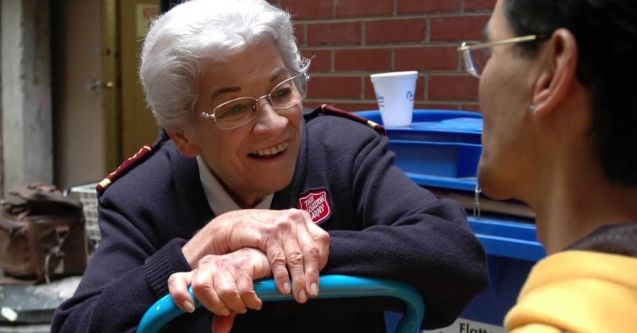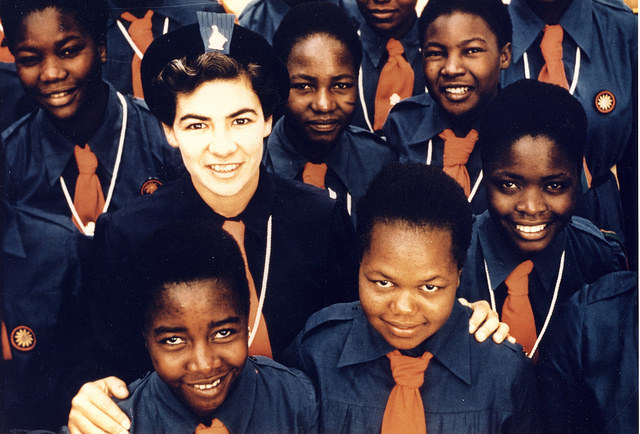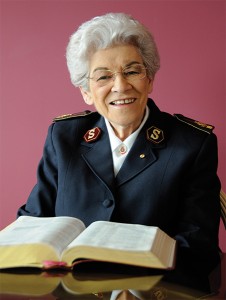General Eva Burrows: Born to lead
9 March 2023

Eva found people fascinating and continued to serve in a voluntary capacity in Melbourne during her retirement
Australian Salvation Army officer Eva Burrows achieved much in her remarkable time on earth, but it was her ability to remain connected to the people that made her one of the most important figures in the history of The Salvation Army.
Born on 15 September 1929 in Newcastle to Salvation Army officer parents Robert and Ella Burrows, Eva Burrows moved around frequently while growing up, due to her parents being Salvation Army officers. Despite these changes, Eva enjoyed school and did well. It was at a youth congress in England in 1950 that Eva decided to start officer training in London, hoping to be commissioned as a Salvation Army officer so she could follow her calling to be a teacher in Africa.
The teaching years
In 1952, Eva arrived at Howard Institute in Rhodesia (now Zimbabwe) – a very large mission station that included a boarding school, teachers’ college and theological college for African students. Eva taught in the primary school before becoming a teacher trainer, while also experiencing first-hand the development of the education system in Zimbabwe.
In 1967, Eva was appointed as the principal of the Usher Institute, a teacher training centre in Zimbabwe. Her leadership skills were evident as she sought to expand the curriculum and academic competence of her students. During that year, she was also a delegate to the International College for Officers in London, where her leadership abilities were noted by Salvation Army leaders.
A change in appointment in 1969 saw Eva leave Africa – a change she found difficult. “When I went to Africa, I thought I’d be there for the rest of my days,” remarked Eva. “It was a grief experience. I really felt that I was leaving part of myself behind.”
However, her skills and insight from having served in Zimbabwe set her up for success in her new role as the vice-principal, and eventually principal, of the International College for Officers in London – where Salvation Army officers from countries around the world came to further their training.

Eva Burrows as a young officer serving in Zimbabwe
A new challenge awaits
Eva’s next appointment, in 1975, was to oversee the Women’s Social Services in Great Britain and Ireland.
“Once I got there and started to have a look at the situation, I was really quite challenged to do something about it,” she recalled. Having seen what she thought was abject poverty in Africa, she was shocked by the extreme poverty in Britain, especially among women.
“I just realised that there was a tremendous need, and The Salvation Army was trying to provide them with some love, some friendship, a place where they could meet other people and enjoy decent food and so forth.”
In January 1977, Colonel Burrows was appointed as the Territorial Commander of Sri Lanka. Learning to live in Asia was a very different experience. “I had to enter into another culture altogether and try and learn. I had to study more about religions because Sri Lanka is a country with long-established religious groups,” she said.
It was here she gained a deeper understanding of other faiths and the responsibility of The Salvation Army to care for the people whom no one else wanted to care for. In a country with great political upheavals and natural disasters, Eva was able to give The Salvation Army a higher profile, through setting up refugee camps and disaster relief.
November 1980 saw Eva appointed as the territorial commander in Scotland, a vast change from the tropical climate of Sri Lanka, and a feeling of familiarity, as her father had migrated from Scotland years ago.
However, soon after her arrival, Eva suffered a coronary and found herself in hospital. Upon waking in the intensive care unit, she found sitting beside her an African nurse. To her great surprise, the nurse turned out to be one of her students from the Usher Institute.
New responsibility with home appointment
A call from the General of the international Salvation Army would change the direction of Eva’s life and see her return home to Australia, as territorial commander in the Australian Southern Territory of the Salvation Army (Melbourne). Along with being the first woman territorial commander in Australia, Eva’s achievements included the establishment of a program for unemployed youth.
Following the retirement of General Wahlstrom, Eva travelled to London to attend the High Council meeting, which was tasked with appointing a new general. Eva sensed she would be nominated, and quickly realised a woman had not been nominated for 50 years, since Evangeline Booth (daughter of founder William Booth) was elected General.
A true world leader and her lasting legacy
Eva’s time as General saw some significant changes in the operations and administration of The Salvation Army, both in England and internationally. Among the highlights of her term was the re-entry of The Salvation Army into Eastern Europe, after being banned in Russia since 1923.
 On 8 July 1993, Eva retired from her position as General of The Salvation Army and returned to Melbourne as her new home. In her retirement, she practised what she preached, often assisting Major Brendan Nottle at Project 614 and contributing to the cause of the Salvos as much as she could.
On 8 July 1993, Eva retired from her position as General of The Salvation Army and returned to Melbourne as her new home. In her retirement, she practised what she preached, often assisting Major Brendan Nottle at Project 614 and contributing to the cause of the Salvos as much as she could.
General Eva Burrows passed away on 20 March 2015, aged 85. Major Nottle paid tribute, saying, “General Eva Burrows was the absolute epitome of what it means to be a true Salvation Army officer.”
Throughout her life as a Salvation Army officer, Eva Burrows became a true citizen of the world. Over her lifetime, she had numerous honours bestowed on her, including the Order of Australia. She had rubbed shoulders with other world religious leaders, prime ministers, presidents and kings. Yet she successfully maintained an authentic relationship with those she supported and served – everyday people in need.
When asked about her life as a Salvation Army officer, she responded, “I think God has given me so much more, and although I didn’t have one person with whom to share all my decision-making and all the problems that I faced, I had family all around the world. The Salvation Army was my family. And the people were my children.”
*This article has been adapted from an original piece by Major David Woodbury in the 150 Years of The Salvation Army (2015) magazine.